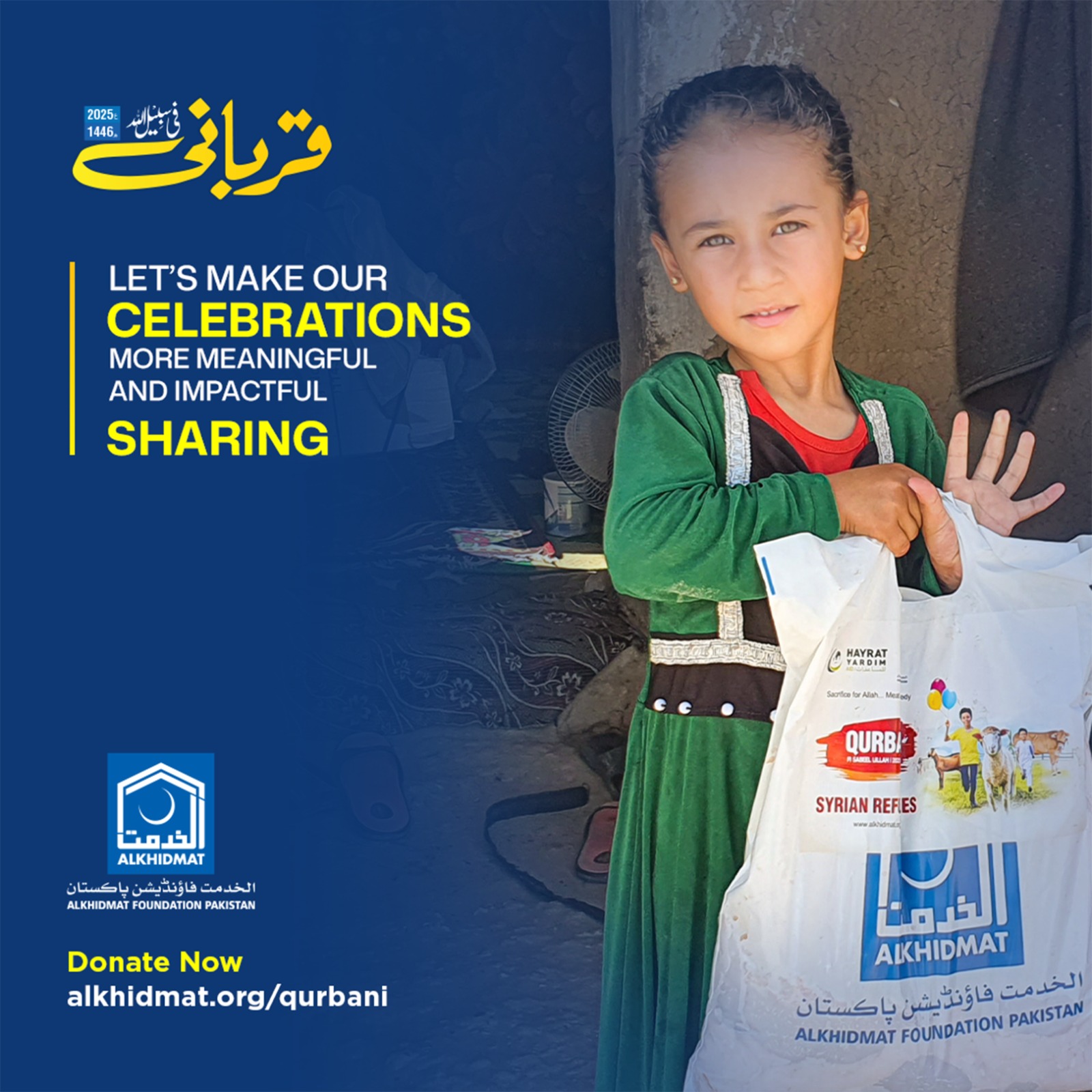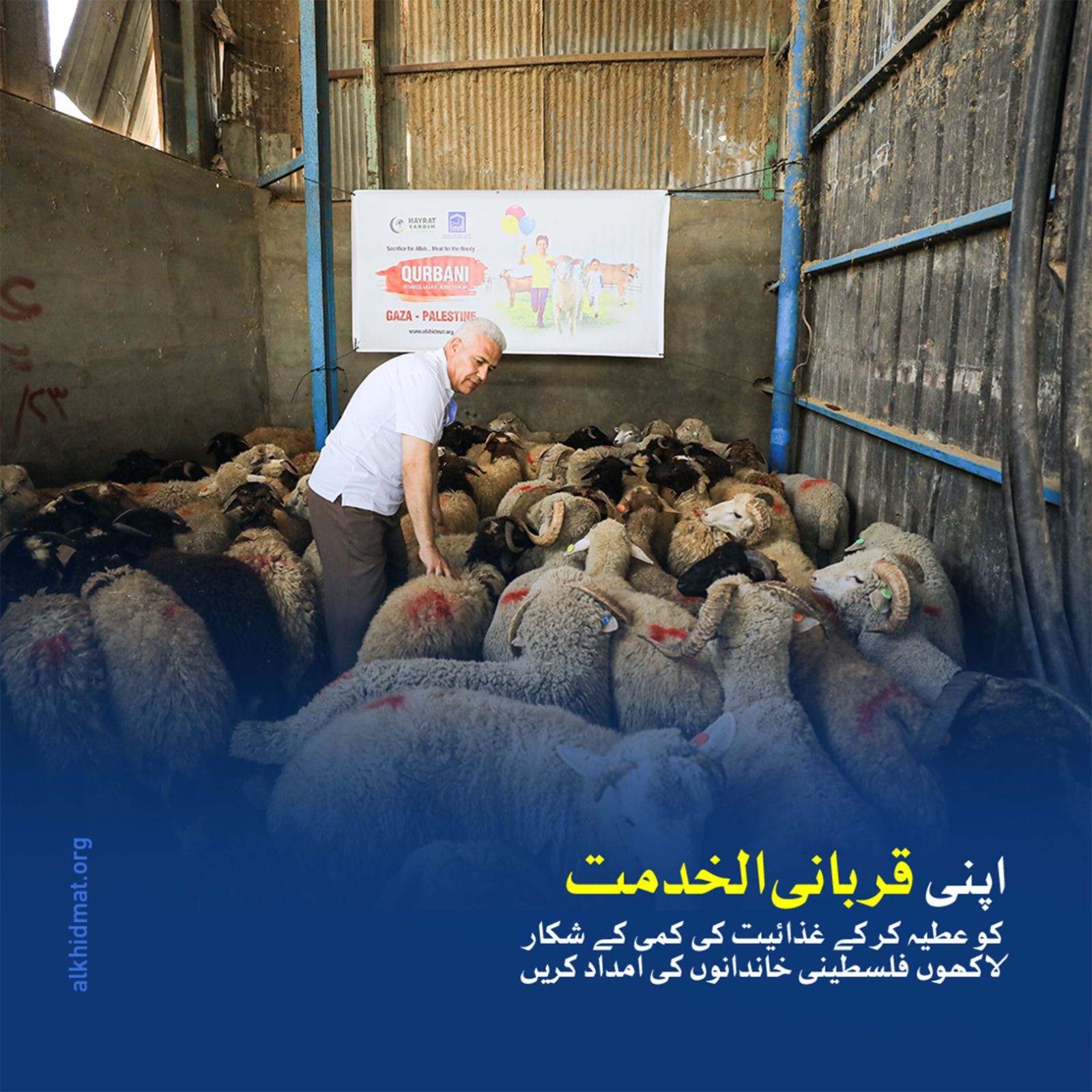- Wafa Murtaza
- May 20, 2025
- Updated about
Donating Qurbani to Palestine has become more urgent than ever due to the region's escalating humanitarian crisis. The ongoing conflict, compounded by blockades and rising food prices, has left millions of Palestinians facing severe food insecurity and deprivation.
According to the United Nation's World Food Programme, there are at least 14,000 who are severely malnourished.
In Deir al-Balah, the Eids are among hundreds of thousands sheltering in squalid tent camps. The local bakeries shut down for five days this week. The price of a bag of bread climbed above $13 by Wednesday, as bread and flour vanished from shelves before more supplies arrived.
Crowds of hundreds wait hours to get food from charities, which are also struggling. Aid agencies report that Palestinians are suffering from severe malnutrition and starvation due to the ongoing Israeli blockade.
Mariam al-Najjar and her mother-in-law cooked peas and carrots in a tent camp, providing the sole meal for their 11 family members, including six children, on Friday. Among Palestinians, “Fridays are sacred,” a day for large family meals of meat, stuffed vegetables or other rich traditional dishes, al-Najjar said.
“Now we eat peas and rice,” she said. “We never ate canned peas before the war. Only in this war that has destroyed our lives.”
Around 2.3 million Palestinians in Gaza rely on canned vegetables, rice, pasta, and lentils, with meat, milk, cheese, fruit, bread, and eggs scarce due to high market prices. “We can’t get anything that provides any protein or nutrients,” al-Najjar said.
When meat became unavailable, she got canned sardines. Those are gone. They used to receive cartons of milk from the U.N. That ended weeks ago. Once a week, she used to buy tomatoes to give her children a salad. Now she can’t afford tomatoes.
Now, they are on a routine of cans of beans or peas and carrots, she said. When they can’t find that, they get lentils or pasta from a charity kitchen. If she finds bread or sugar, she gives her kids bread dunked in tea to stave off their hunger, she said.
“I’m afraid my son’s children will die of hunger,” said Mariam’s mother-in-law Sumaya al-Najjar. The 61-year-old said she and her husband have cancer; she has stopped taking her medication because its unobtainable, and her husband is being treated in a hospital.
Mariam worries how she’ll feed her children when what’s left in Gaza runs out.
“Maybe we’ll eat sand,” she said.
Why Gaza Needs Your Qurbani This Year
1. Widespread Hunger and Food Scarcity Scale
Over 2.3 million Palestinians in Gaza are struggling to survive on dwindling resources. Essential nutritious items like meat, milk, and fruits have vanished from the markets, leaving families subsisting on canned vegetables, rice, lentils, and scarce bread. The blockade, following the collapse of a ceasefire in March 2025, has halted the delivery of food, fuel, and medical supplies, exacerbating the crisis.
Palestinians in Gaza are on the brink of starvation- Unicef’s James Elder tells Channel 4 that the ‘entire child population is at risk of malnutrition’ in Gaza, saying he has ‘never heard the level of despair and despondency.’
Food security experts warn Gaza is at critical risk of famine if Israel does not end its blockade.
As the number of people killed in Gaza since 7 October 2023 has reached 53,339, with 121,034 others wounded, according to the Palestinian health ministry and as Gaza’s government media office warns of widespread famine among Gaza's population.
2. Tuff livestock equipment prices
The cost of purchasing meat for the Eid ritual this year varies between $500 and $900. However, participation rates are significantly lower than previous years due to the high prices and the difficult economic situation. Many residents are unable to afford livestock for sacrifice, and merchants are concerned about potential financial losses due to weak customer demand.
3. Limited Local Meat Supply
Due to the ongoing war and political instability, local farms in Gaza are producing a fraction of their usual output. Markets are nearly empty, and any remaining goods are unaffordable for most residents. Charity kitchens, the last food lifeline for many, are on the verge of shutting down due to supply shortages.
4. International Organizations Movement
Organizations like Alkhidmat Foundation are stepping in to provide Qurbani meat to Gaza. Due to the ongoing war, they are procuring and sacrificing animals in Egypt, then immediately freezing and transporting the meat to Gaza in refrigerated trucks. This ensures that the meat reaches Gaza and is distributed within 4-8 days after slaughter, despite the challenges posed by the blockade.
How Kids Are Getting Sick Because of Poor Nutrition
“Children need the food pyramid for their development,” Abu Teir, head of the Therapeutic Feeding department said: meat, eggs, fish and dairy for their growth, fruits and vegetables to build their immune systems. “These do not exist in Gaza,” he said.
He said a 1-year-old child weighing 10 kilos (22 pounds) needs about 700 calories a day.
The four cans of peas and carrots in the al-Najjars’ Friday meal totaled about 1,000 calories, according to label information — not counting the rice they also ate – split among 11 people, including six children between the ages of 6 and 14.
“I dream of eating a tomato,” said Khalil al-Faqawi, standing in front of the empty stalls.
He said he has nine people to feed. “The children ask for meat, for chicken, for a cookie. We can’t provide it,” he said. “Forget about meat. We’ve got lentils. Thank you very much. What happens when the lentils run out?”
Deprived of the Joy of the Eid in Gaza
Last year Alkhidmat foundation distributed qurbani meat as nutritious meal parcels to thousands of people in Gaza amid unimaginable sufferings and hunger.
For the Eids, hunger is the daily routine


For months, Yasmin and her family have gone to bed hungry.
“Everything has increased in price, and we cannot buy anything,” she said. “We always go to sleep without having dinner.”
She misses coffee, but a single packet of Nescafe goes for around $1.30. A kilogram (2 pounds) of onions goes for $10, a medium bottle of cooking oil for $15 — if available. Meat and chicken all but vanished from the markets months ago, but there are still some local vegetables. Such sums are astronomical in an impoverished territory where few people earn regular incomes.
How Do We send Qurbani Meat into Palestine?
Alkhidmat facilitates Qurbani distribution for displaced Palestinian families from Palestine residing in refugee camps and settlements across Cairo, Lebanon, Jordan (Amman), and the West Bank (including Al-Quds). Tin packed provides Qurbani meat in hygienic, long-shelf-life tins for Gazan families in Cairo refugee camps, making storage and distribution more efficient.
Uplift the Families in Need and Give their Share This Eid
Your Qurbani donation can provide much-needed relief to families in Gaza. By contributing, you can help ensure that they receive nutritious meat during Eid al-Adha, offering them a semblance of normalcy and hope amidst the ongoing crisis. Your Qurbani donation is not just a ritual; it's a lifeline for families enduring unimaginable hardships.
To donate, you can visit Alkhidmat Foundation which is actively facilitating Qurbani donations for Palestine. The organization has established channels to ensure that your contributions reach those in need efficiently and effectively.
Bio.
show more
It is a long established fact that a reader will be distracted by the readable content of a page when looking at its layout.
It is a long established fact that a reader will be distracted by the readable content of a page when looking at its layout.